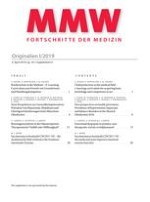Erschienen in:

20.03.2019 | Gastroösophageale Refluxkrankheit
Reizmagensyndrom in der Hausarztpraxis
Therapeutische Vielfalt oder Hilflosigkeit?
verfasst von:
Dr. med. Christian Labenz, Prof. Dr. med. Ahmed Madisch, Prof. Dr. med. Joachim Labenz
Erschienen in:
MMW - Fortschritte der Medizin
|
Sonderheft 4/2019
Einloggen, um Zugang zu erhalten
Zusammenfassung
Hintergrund
Etwa 5% aller ärztlichen Konsultationen in der Hausarztpraxis erfolgen wegen Symptomen eines Reizmagensyndroms (RMS). Die Definition des RMS ist im Fluss, die Pathophysiologie nur unzureichend verstanden und aktuelle Diagnose- und Therapiealgorithmen sind nicht vorhanden.
Ziel
Evaluation der Häufigkeit und des praktischen Vorgehens in der Diagnostik und Therapie des RMS in deutschen Hausarztpraxen.
Methode
In Deutschland tätige Hausärzte (Allgemeinmediziner, hausärztliche Internisten) wurden über eine postalische Umfrage kontaktiert. Abgefragt wurden die Häufigkeit von RMS-Patienten pro Woche, das geklagte Symptomspektrum und die Therapiestrategie.
Ergebnisse
Daten von 322 Ärzten aus ganz Deutschland konnten ausgewertet werden. Der größte Teil der Ärzte betreute 6–10 RMS-Patienten pro Woche (44,1%). Die häufigsten von Patienten geschilderten Symptome waren postprandiales Völlegefühl (81,7%), Schmerzen oder Brennen im Oberbauch (77,3%) und Aufstoßen (75,0%). Weniger häufig wurden Sodbrennen (50,0%), Übelkeit/Erbrechen (42,5%) und vorzeitige Sättigung (15,8%) angegeben. Die am häufigsten verordneten Medikamente waren Phytotherapeutika (88,2%), Protonenpumpenhemmer (PPI, 73,6%) und Prokinetika (61,5%). Die Frequenz der Verschreibung von Antazida, Verdauungsenzymen des Magens und des Pankreas lag bei 10–20%. Es bestand ein Trend zur symptomabhängigen Differentialtherapie: Phytotherapeutika und Prokinetika bei postprandialem Völlegefühl und vorzeitiger Sättigung, PPI bei Oberbauchschmerzen/-brennen. Die Therapieversagerquote wurde auf 21–40% geschätzt. Zur weiteren Abklärung wird häufig an Gastroenterologen und auch Psychotherapeuten überwiesen.
Schlussfolgerung
Patienten mit RMS sind in der hausärztlichen Praxis häufig. Aktuelle Empfehlungen zur Diagnose und Differentialtherapie werden häufig nicht umgesetzt. Die Quote an Therapieversagern ist beträchtlich.